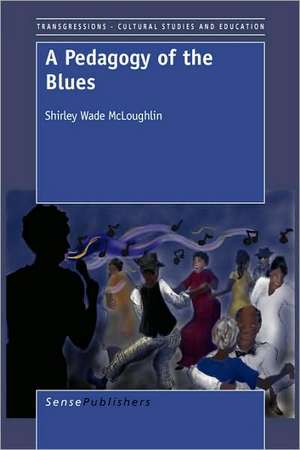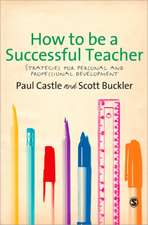A Pedagogy of the Blues
Autor Shirley Wade McLoughlinen Limba Engleză Hardback – 30 dec 2008
| Toate formatele și edițiile | Preț | Express |
|---|---|---|
| Paperback (1) | 326.62 lei 3-5 săpt. | |
| Brill – 31 dec 2008 | 326.62 lei 3-5 săpt. | |
| Hardback (1) | 559.07 lei 38-44 zile | |
| Sense Publishers – 30 dec 2008 | 559.07 lei 38-44 zile |
Preț: 559.07 lei
Preț vechi: 690.21 lei
-19% Nou
Puncte Express: 839
Preț estimativ în valută:
106.99€ • 111.07$ • 89.21£
106.99€ • 111.07$ • 89.21£
Carte tipărită la comandă
Livrare economică 18-24 martie
Preluare comenzi: 021 569.72.76
Specificații
ISBN-13: 9789087906924
ISBN-10: 9087906927
Pagini: 136
Dimensiuni: 156 x 234 x 10 mm
Greutate: 0.37 kg
Editura: Sense Publishers
Locul publicării:Netherlands
ISBN-10: 9087906927
Pagini: 136
Dimensiuni: 156 x 234 x 10 mm
Greutate: 0.37 kg
Editura: Sense Publishers
Locul publicării:Netherlands
Descriere
Descriere de la o altă ediție sau format:
With the increasingly techno-rational approach to education causing a sense of hopelessness among educators in both public schools and higher education institutions, alternative pedagogical approaches are needed to provide educators with the means to navigate through oppressive milieus. The author offers her conceptualization of a pedagogy of the blues as such an approach. This work is grounded in the powerful early blues of African Americans, identifying specific themes representative of the blues metaphor that reverberate in the work of early blues artists. Using a predominantly cultural studies lens, the author traces the emergence and evolution of the blues metaphor from pre-slavery Africa’s musical forms to the music of the slaves. She then closely examines the emergence of the blues as a form of popular music in the 1920s. analyzing popular culture representations of the blues artists, historical artifacts, recordings, lyrics of early blues, and other sources of data. From this material, certain themes emerge and are identified as part of the blues metaphor. These themes and their evolution are traced through other forms of popular music, including jazz, country, rhythm and blues, rock, folk, and rap. The author then uses these powerful themes to mold a conceptualization of a pedagogy of the blues, a pedagogical approach that allows educators to hope, to resist, and to transcend the oppressive environments that exist in today’s educational settings.
With the increasingly techno-rational approach to education causing a sense of hopelessness among educators in both public schools and higher education institutions, alternative pedagogical approaches are needed to provide educators with the means to navigate through oppressive milieus. The author offers her conceptualization of a pedagogy of the blues as such an approach. This work is grounded in the powerful early blues of African Americans, identifying specific themes representative of the blues metaphor that reverberate in the work of early blues artists. Using a predominantly cultural studies lens, the author traces the emergence and evolution of the blues metaphor from pre-slavery Africa’s musical forms to the music of the slaves. She then closely examines the emergence of the blues as a form of popular music in the 1920s. analyzing popular culture representations of the blues artists, historical artifacts, recordings, lyrics of early blues, and other sources of data. From this material, certain themes emerge and are identified as part of the blues metaphor. These themes and their evolution are traced through other forms of popular music, including jazz, country, rhythm and blues, rock, folk, and rap. The author then uses these powerful themes to mold a conceptualization of a pedagogy of the blues, a pedagogical approach that allows educators to hope, to resist, and to transcend the oppressive environments that exist in today’s educational settings.













